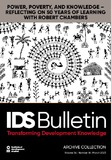Power, Poverty, and Knowledge – Reflecting on 50 Years of Learning with Robert Chambers
| dc.contributor.author | Thompson, Stephen | |
| dc.contributor.author | Cannon, Mariah | |
| dc.date.accessioned | 2023-03-28T14:02:58Z | |
| dc.date.available | 2023-03-28T14:02:58Z | |
| dc.date.issued | 2023-03-31 | |
| dc.identifier.citation | Thompson, S. and Cannon, M. (2023) 'Power, Poverty, and Knowledge – Reflecting on 50 Years of Learning with Robert Chambers', IDS Bulletin 54.1A, DOI: 10.19088/1968-2023.112 | en |
| dc.identifier.uri | https://opendocs.ids.ac.uk/opendocs/handle/20.500.12413/17928 | |
| dc.description.abstract | Robert Chambers is one of the most influential and prolific scholars to write about participation, poverty, and knowledge in development studies. His writing and thinking have revolutionised the discipline, inspiring both participatory processes and more inclusive practice. His work continues to inspire and provoke debate and discussion among development practitioners, activists, and academics from around the world. Here we present an Archive Collection of the IDS Bulletin in a celebration of Robert’s contribution to the journal over the last five decades. The eight articles included in this IDS Bulletin Archive Collection clearly show change – change in Robert’s evolving interests, change in the strategic focus of IDS as a research institute, change in the wider development studies field, as well as change in the world at large over the last 50 years. Robert’s earlier IDS Bulletin articles show a strong focus on local knowledge and rural development. Over time, this shifts to a concern with professional development management, and a focus on power and participatory methods. While each article stands alone, these themes re-occur and re-emerge. Bias or unfairness in the development sphere is a major concern which Robert highlights in his IDS Bulletin articles, whilst his advocacy for bottom-up, diverse, and process-led approaches to participation clearly emerges. As the editorial introduction explains and explores, the premise of this IDS Bulletin Archive Collection is to delve into Robert’s contribution to the journal, to resurface buried gems of development studies scholarship, and to reinvigorate debates about how we can do better – a question described by Robert as the eternal challenge of development. | en |
| dc.language.iso | en | en |
| dc.publisher | Institute of Development Studies | en |
| dc.relation.ispartofseries | IDS Bulletin;54.1A | |
| dc.rights | This IDS Bulletin Archive Collection is an Open Access publication distributed under the terms of the Creative Commons Attribution 4.0 International licence (CC BY), which permits unrestricted use, distribution, and reproduction in any medium, provided the original authors and source are credited and any modifications or adaptations are indicated. | en |
| dc.rights.uri | http://creativecommons.org/licenses/by/4.0/ | en |
| dc.subject | Participation | en |
| dc.subject | Politics and Power | en |
| dc.subject | Poverty | en |
| dc.title | Power, Poverty, and Knowledge – Reflecting on 50 Years of Learning with Robert Chambers | en |
| dc.type | Article | en |
| dc.rights.holder | Institute of Development Studies | en |
| dc.identifier.team | Participation Power and Social Change | en |
| dc.identifier.doi | 10.19088/1968-2023.112 | |
| dcterms.dateAccepted | 2023-03-31 | |
| rioxxterms.funder | Default funder | en |
| rioxxterms.version | VoR | en |
| rioxxterms.versionofrecord | 10.19088/1968-2023.112 | en |
Files in this item
This item appears in the following Collection(s)
Except where otherwise noted, this item's license is described as This IDS Bulletin Archive Collection is an Open Access publication distributed under the terms of the Creative Commons Attribution 4.0 International licence (CC BY), which permits unrestricted use, distribution, and reproduction in any medium, provided the original authors and source are credited and any modifications or adaptations are indicated.


